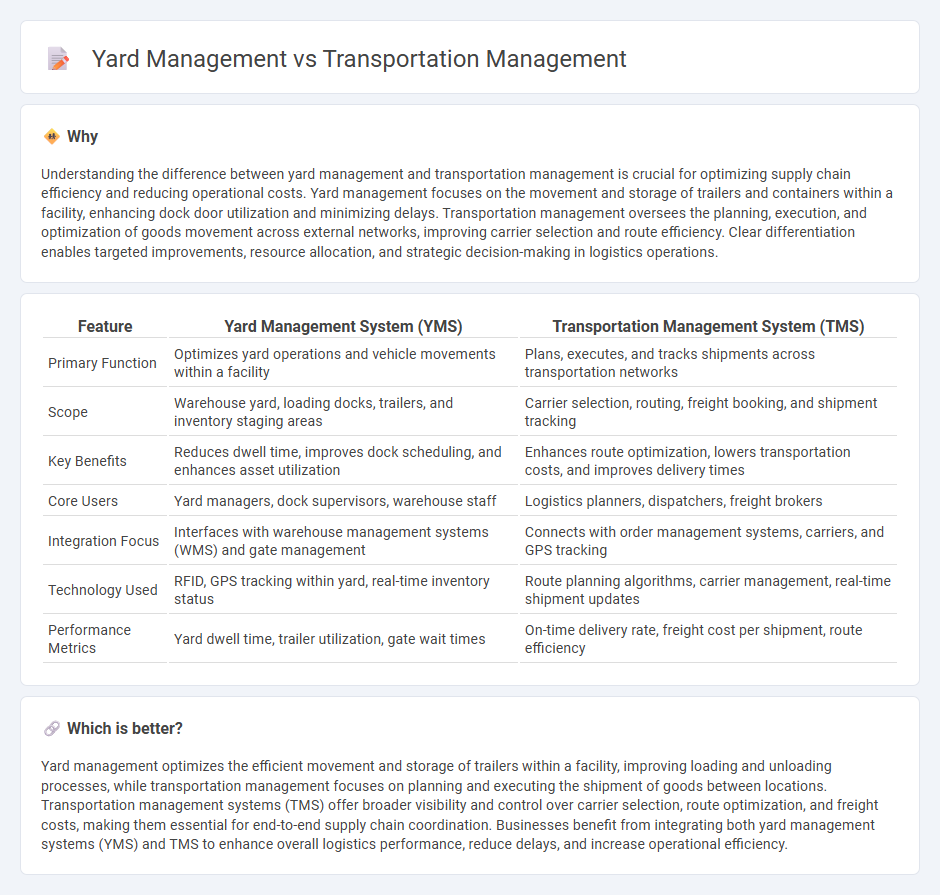
Yard management focuses on optimizing the flow of trailers and inventory within a facility's yard, enhancing loading dock efficiency and reducing waiting times. Transportation management entails planning, executing, and optimizing the movement of goods across various modes of transport, ensuring timely delivery and cost control. Discover how integrating yard management with transportation management can elevate overall supply chain performance.
Why it is important
Understanding the difference between yard management and transportation management is crucial for optimizing supply chain efficiency and reducing operational costs. Yard management focuses on the movement and storage of trailers and containers within a facility, enhancing dock door utilization and minimizing delays. Transportation management oversees the planning, execution, and optimization of goods movement across external networks, improving carrier selection and route efficiency. Clear differentiation enables targeted improvements, resource allocation, and strategic decision-making in logistics operations.
Comparison Table
| Feature | Yard Management System (YMS) | Transportation Management System (TMS) |
|---|---|---|
| Primary Function | Optimizes yard operations and vehicle movements within a facility | Plans, executes, and tracks shipments across transportation networks |
| Scope | Warehouse yard, loading docks, trailers, and inventory staging areas | Carrier selection, routing, freight booking, and shipment tracking |
| Key Benefits | Reduces dwell time, improves dock scheduling, and enhances asset utilization | Enhances route optimization, lowers transportation costs, and improves delivery times |
| Core Users | Yard managers, dock supervisors, warehouse staff | Logistics planners, dispatchers, freight brokers |
| Integration Focus | Interfaces with warehouse management systems (WMS) and gate management | Connects with order management systems, carriers, and GPS tracking |
| Technology Used | RFID, GPS tracking within yard, real-time inventory status | Route planning algorithms, carrier management, real-time shipment updates |
| Performance Metrics | Yard dwell time, trailer utilization, gate wait times | On-time delivery rate, freight cost per shipment, route efficiency |
Which is better?
Yard management optimizes the efficient movement and storage of trailers within a facility, improving loading and unloading processes, while transportation management focuses on planning and executing the shipment of goods between locations. Transportation management systems (TMS) offer broader visibility and control over carrier selection, route optimization, and freight costs, making them essential for end-to-end supply chain coordination. Businesses benefit from integrating both yard management systems (YMS) and TMS to enhance overall logistics performance, reduce delays, and increase operational efficiency.
Connection
Yard management and transportation management are interconnected through the coordination of inbound and outbound shipments, ensuring timely loading and unloading of goods. Efficient yard management optimizes vehicle flow and dock assignments, directly impacting transportation schedules and reducing delays. Integrated systems enhance visibility across both processes, improving inventory accuracy and overall supply chain efficiency.
Key Terms
**Transportation Management:**
Transportation management involves the planning, execution, and optimization of the movement of goods across various modes such as trucks, rail, air, and sea, ensuring timely delivery and cost efficiency. It encompasses route planning, carrier selection, freight auditing, and compliance with transportation regulations to streamline supply chain operations. Explore our insights to understand how advanced transportation management systems can enhance logistics performance and reduce operational costs.
Route Optimization
Transportation management centers on planning, executing, and optimizing the movement of goods across various routes to reduce costs and enhance delivery efficiency. Yard management, on the other hand, focuses on controlling the flow and storage of vehicles and trailers within a yard to streamline loading, unloading, and dock operations. Explore in-depth strategies and tools for improving route optimization in transportation management and its impact on yard operations by learning more.
Freight Consolidation
Transportation management optimizes freight consolidation by coordinating shipments to maximize load efficiency and reduce transportation costs across the supply chain. Yard management, while focused on onsite vehicle movements and dock operations, supports freight consolidation by ensuring timely loading and unloading, minimizing delays and congestion in the yard. Explore our in-depth analysis of how integrating transportation and yard management enhances freight consolidation effectiveness.
Source and External Links
What is a Transportation Management System (TMS)? | Manhattan - A Transportation Management System (TMS) is a supply chain software solution that optimizes, plans, and executes logistics services for transporting goods, offering real-time visibility, route optimization, cost reduction, and improved coordination of fleets.
Transportation Management Software (TMS) | Blue Yonder - Blue Yonder's TMS manages inbound, outbound, and multi-mode logistics with advanced optimization, real-time data, and collaboration tools to improve efficiency, service levels, and transportation planning across global networks.
What Is a Transportation Management System? | Oracle - A TMS helps businesses plan, execute, and optimize the movement of goods by selecting the best shipment modes and carriers, providing end-to-end visibility, real-time tracking, and compliance with international trade regulations.
 dowidth.com
dowidth.com